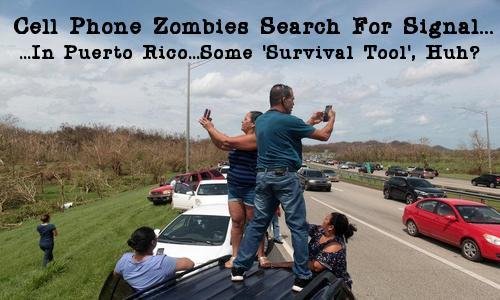Uses for a ham radio

This is a photo of people in Puerto Rico trying to get some bars on their cell phones. This same thing has happened to many of us but probably not as severe. I heard that the power was completely out in Puerto Rico after the hurricane. So that means the cell phone towers were probably down also.
When we are hit with a disaster, the first thing we reach for is the cell. Unfortunately, they don't always work and it some cases it might be days before communications are restored. If we were to experience a catastrophic incident, we might be without communications both landlines and cell phones.
Communication with family is of utmost importance, checking if everyone is safe or setting up meet up spots. There are other things we rely on communications for such as calling for help. If you're solely relying on the most conventional form of communication, you'll be out of luck.
Ham radios have been used in the past when other forms of communications have failed. Some examples are 9/11 attacks, north American blackout in 2003 and hurricane Katrina are a few. Ham radios are currently being use in Puerto Rico.
The FCC (Federal Communications Commission) is responsible for licensing ham operators. There is a national organization of ham operator called the ARRL (American Radio Relay League), the league has registered some of these hams for ARES (Amateur Radio Emergency Service). This service provices emergency communications during disasters. FEMA (Federal Emergency Management Agency) has sponsored a new branch called RACES (Radio Amateur Civil Emergency Services). RACES operators are authorized to operate if the President invokes the War Emergency Powers while all other amateur services would be shut down.
In order to transmit on a ham radio, you must be licensed. There are several teaching aids available to help you take and pass the test. The first test you must pass is for a Technician's License. This test consist of 35 questions and to pass you must get 75% or better. Good news, now there are no Morse code exams. With a Technician's license, you get permission to operate on the VHF (Very High Frequency), UHF (Ultra High Frequency) and limited HF (High Frequency). If you wish to talk to people locally, this is the license for you. Once you passed the Technician's test, you can take the General test. This again is 35 questions. Having passed the General test, you now have permission to broadcast over the entire band with some limitations of certain HF bands. If you wish to talk to people around the world, this is the license you want. There is one additional test, this is for the Extra Class, this will add privileges on the HF bands not included in the General license.
To sign up for the test(s) contact your local ham radio club. Usually members of the club will have dates for up coming tests. The test will likely be held at their meeting hall and be proctored by their members. The proctors are called VEs (Volunteer Examiners). The test will be graded shortly after you complete it and you will know the results before you leave. I believe you can sign up to take the Technician, the General and the Extra on the same day but you will need to verify this with the local ham club. The cost of the tests are about $15. Once you pass you will be issued a 'call sign'. This call sign is used to identify you when you are broadcasting.
Other forms of non-conventional communications are CB (Citizen Band), FRS (Family Radio Service) and scanners. CB is a somewhat good alternative but the range is limited and in some cases it will not work. CBs don't require a license. These are the radios that many truck drives use. FRS are more limited in range and not recommended due to their low power. Scanners are receive only so not useful to communicate.
Overall having a ham radio and being licensed is a good backup plan. There are several types of ham radios ranging from a few hundred to several hundred. When buying, you should check the bands it will operate on and match them to your privileges. You might not want a radio (costing more) that can operate on the HF band when you only have privileges for the VHF and UHF bands. There are also handie talkies which are much more portable and lower power. These use repeaters to increase their broadcasting range.
Thank you for reading. Stay prepared and safe.
Sources: allnewspipeline.com
en.wikipedia.org
hamuniverse.com
hamradiolicenseexam.com
Nice
Glad you enjoyed it. Have a nice day.
Thank you very much,